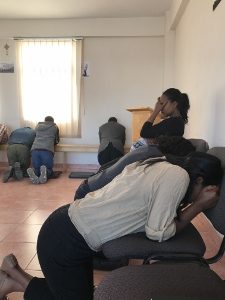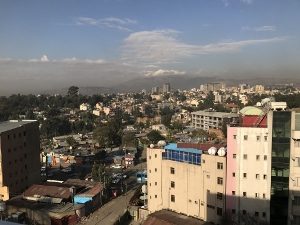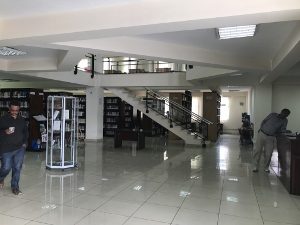A vibrant faith is lived out at the Ethiopian Graduate School of Theology (EGST). There is an optional prayer meeting for staff on Friday mornings. Staffan and I joined them. An 7th month pregnancy, Staffan’s back, and some chrondomalagia in my left knee kept three of us seated while the rest kneeled in prayer.



Then it was off to email and posting my blogs written at the guest house (which doesn’t have WIFI). My AirBnB reservation request (for visiting universities in London that Anya wants to check out) that I sent last Friday was confirmed by the host, Ching, on Saturday before I left. On Monday, I received an email from Ching saying that she has to cancel, so I should cancel the reservation. I checked the website, and it clearly states that the host must cancel, but she wants to protect her host rating. If I cancel, I don’t get a full refund. Ching even lied saying that her website instructions state that I should cancel it. I keep telling her that she has to cancel it, so I get my full refund, as I had already cut and paste from my renter interface on the AirBnB website. Then, she offered to wire me money to my bank account for any cancellation fee I incur. I told her that I don’t trust her, after all she has already lied to me, and I don’t want the hassle of sending my bank account information (creepy) and having to check that she actually sends it. And what if she doesn’t? After 4 days of run around, she has still not cancelled the reservation. I have even pondered making a $360 dollar investment in serving justice by not cancelling. (I already had my sister make hotel reservations, because I do not have secure WIFI.) My INFJ temperament is similar to Gandhi (not that I claim to be of that caliber), but we have a righteous anger that gets stirred up against injustice. I won’t be able to leave a post relaying her behavior if I cancel, but if she cancels or if I do not cancel, then I can make a posting on her listing and hold her accountable for her actions and warn other people. Pray that she cancels. (As of the time of this posting, I was notified by AirBnB that my money was refunded. Wheh!)
After the tea/coffee break (most drink coffee here in the country which claims the origin of coffee from the Kafe region), I explored the library. It is pretty well supplied, except I would like to see more on African biblical hermeneutics. They have a section of African books and Ethiopian books. I relayed to one bright young American on the faculty, Andrew, that it would be great to have 2 copies of the African texts and put the other one in the standard hermeneutics section to make the African voices more inclusive. Some might not even check the African section for African hermeneutics.


Staffan and I had pasta for lunch. Too much injira can cause an irritated stomach, as it is quite acidic, I’m told. Then after some more emails, I was able to listen into the faculty meeting (in English! In Sweden, the faculty meetings are not in English. How great to be able to really understand what is going on). Part of the conversation revolved around branding and recruitment, stimulated by Andrew, so I offered to talk with Andrew afterwards and share some things from my experience working in admissions and communications. He is a bright and energetic guy. Then Staffan joined us, and he shared more of his story coming out during the Marxist era with his young children. Andrew was obviously honoring of Staffan’s courage and faithful service.
There was an academic lecture in the evening. Friday night seems strange for an academic lecture, but it was quite well attended. The speaker was from the USA. He and the university he comes from shall remain nameless, because I was not impressed. He spoke about the text, which appears in Matthew, Mark, and John, “the poor will be with you always.” He did a survey of much the entire Bible (thus, surface depth without much context), quoting representative Bible verses that supported his thesis that social justice was part of the biblical message, not just evangelism. Here’s my critique… While it was obvious that he had a vast knowledge of the Bible, he did not even mention the Deut 15 passage and its context, from which Jesus is quoting!!! How can he miss this!?! This is so important! His methodology was a rather cherry-picked selection, almost proof-texting, and simply a survey. His thesis is quite late 20th century evangelicalism, and not an issue in Africa, where African theologians are less influenced by the Enlightenment and interpretation is not separated from application (unless they simply follow a Western method very formally). His examples were totally unrelateable to this context, saying, “Well you might work for ‘whatever is right’ if you mow your grandmother’s lawn.” Lawns, much less mowing them, are not typical in Africa, except for the inordinately wealthy. He also asked, “What really does it mean to be poor?” He mentioned that people can be very wealthy and spiritually poor, so materially poor isn’t as bad a spiritually poor. I thought this was very insensitive to state from a position of Western privilege after he was introduced with the statement that Ethiopia ranks way in the bottom of the development index, even below South Sudan! Then, he makes no comment upon how the biblical representations of poor relate to a deed/nexus consequence (a Deuteronomistic perspective). There are some prosperity gospel preachers who make the claim that poor are poor because of their sin, lack of faith, curses, etc. Scripture can be cherry picked to support this, but it can be strongly refuted with a broader biblical discussion. He doesn’t understand this context! At the discussion time, he talked about his teaching of interpretive methods (exegesis), and he includes looking at other perspectives. But it is a 1984 text written by a Western Caucasian representing other indigenous voices. “Speaking for others” is not a good way to go, especially when there are so many Majority World scholars with good articles. Ugh! My righteous anger was contained, but I did ask two pointed questions graciously. Ugh! I wonder why was he chosen for an academic lecture?
Once on the way back from teaching a course “Christianity in Tanzania” (with you, Jean), I was on the plane with an American who had just spent a week or two preaching for an international denomination with a small representation in Tanzania. I had not heard that this denomination was in Tz, so with my good “seeking to understand” Christianity in Tz, I started asking him questions. However, I soon discovered that he didn’t know how long the denomination had been in Tz, how many churches there were, what areas of Tz had representation of the denomination, what people groups were part of the local congregation where he preached, or other basic understandings about Tz. While he was seemingly trying to distance himself from the conversation with me, I heard a few comments from his wife about other travels and preaching in different countries. I started wondering if this was their tax-deduction travel plan: make connections with churches from the denomination in an exotic location, preach for a bit, go on safari or see the sights, and then claim the travel expenses as a business trip in order to qualify for a tax deduction. Well, I pray that they, and perhaps others like him, are learning from their experience and hopefully shaped by the indigenous expressions of Christianity where they travel. I would hope that every itinerant preacher to Ethiopia (or wherever) would learn the history of church where they are visiting. It is humbling. (There are also established best practices of short-term mission based on good missiological research.)
With deep thoughts and blessings,
Beth